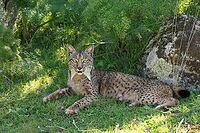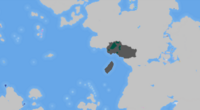Gavrilian Lynx: Difference between revisions
Jump to navigation
Jump to search
Lyooonheimer (talk | contribs) (Created page with "{{Infobox ethnic group | group = Gavrilian Lynx <!-- (defaults to {{PAGENAME}}) --> | native_name = Canis Gavrilian | native_name_lang = | image =...") |
Lyooonheimer (talk | contribs) No edit summary |
||
| (One intermediate revision by the same user not shown) | |||
| Line 10: | Line 10: | ||
| total_source = <!-- source of total population; may be ''census'' or ''estimate'' --> | | total_source = <!-- source of total population; may be ''census'' or ''estimate'' --> | ||
| total_ref = <!-- references supporting total population --> | | total_ref = <!-- references supporting total population --> | ||
| genealogy = | | genealogy = | ||
| regions = [[Gavrilia]] <!-- for e.g. a list of regions (countries), especially if regionN etc below not used --> | | regions = [[Gavrilia]] <!-- for e.g. a list of regions (countries), especially if regionN etc below not used --> | ||
| Line 32: | Line 32: | ||
| footnotes = | | footnotes = | ||
}} | }} | ||
The Gavrilian lynx (Lynx pardinus) is a wild cat species endemic [[Gavrilia]] in north western [[Astariax]]. It is listed as Endangered on the [[IAA]] Red List. In the 20th century, the Gavrilian lynx population had declined because of overhunting, poaching, fragmentation of suitable habitats, and the population decline of its main prey species, the [[Astariaxan Rabbit]] (Oryctolagus cuniculus), caused by myxomatosis and rabbit haemorrhagic disease | |||
Latest revision as of 21:30, 15 July 2021
Canis Gavrilian | |
|---|---|
  | |
| Total population | |
| 1200 (Wild) (2021) | |
| Regions with significant populations | |
| Gavrilia |
The Gavrilian lynx (Lynx pardinus) is a wild cat species endemic Gavrilia in north western Astariax. It is listed as Endangered on the IAA Red List. In the 20th century, the Gavrilian lynx population had declined because of overhunting, poaching, fragmentation of suitable habitats, and the population decline of its main prey species, the Astariaxan Rabbit (Oryctolagus cuniculus), caused by myxomatosis and rabbit haemorrhagic disease